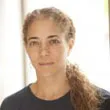Deborah Thomas: The Time of the Archive

For over 30 years, Swarthmore has dedicated itself to recognizing the intellectual, social, and cultural achievements and contributions of the African American community. Although this recognition is manifested year-round in the work of the Black Cultural Center (BCC), the Black Studies Program, and many other organizations, the College takes special note during the month of February in celebration of Black History Month.
The month was marked by intellectually stimulating events and symposiums. The BCC, Black Studies Department, Swarthmore African-American Student Society, and more than 10 additional sponsors hoped to promote campus-wide discussion and provide Swarthmore with the opportunity to engage in conversations about social problems faced in the African American community and what it means to means to live in a "post-racial" society. The sponsors organized and promoted a series of faculty lectures, musical performances, social events, and discussion-based interactions to encourage engagement in Black history and culture.
This year's Black History Month celebration was entitled "Freedom Now" and promoted the exploration of history and the discussion of contemporary socioeconomic issues affecting the Black community. The theme focused on following the question of black identity from the slavery era through the physical emancipation of slaves to the reality of freedom today, questioning how black communities practice their freedom through activism and education. The plethora of events provided students and faculty with the opportunity to demystify stereotypes and misconceptions, while celebrating diversity and inclusion. The events were also used to think about the different, intersecting ideas of race, gender, inclusion, diversity, and sexual orientation and how they fit in with a system of oppression.
The month's activities kicked off with the arrival of Robert George '77 and Cornel West at the Black Cultural Center. Students and faculty discussed a wide range of issues in a seminar-like setting, as well as productive ways to engage in those conversations. After their visit to the BCC, George and West later held a collection in the Friends Meetinghouse to discuss what it means for intellectuals to learn from each other despite deep differences on important questions.
Alexander Anderson '13 visited the BCC to speak about his experiences as both an artist and a Fulbright Scholar. Anderson won a Fulbright last year and is about to embark on a 10-month artist residency program in China.
The month's keynote speaker, anthropologist Deborah Thomas, gave a lecture, "The Time of the Archive: Visual Anthropology and State Violence in Jamaica." Thomas is a professor in the anthropology department at the University of Pennsylvania, with research interests in Caribbean studies, race and gender, and the violence of transnationalism and diaspora. Her talk connected events in Jamaica with the widespread state-sponsored violence in the United States that so deeply affects the Black community.
Later that week, the Yale Black Solidarity Conference presented "Rooted: The Odyssey of Black Art." The presentation explored the diversity of art mediums in the depiction of black culture and the propagation and/or prevention of racism and stereotyping of the black community. The hope was that conference participants would gain a better understanding of art as a medium for social activism, and would consequently leave the conference with different ways and strategies of engaging our community around Black issues.
A series of cultural events on campus also celebrated Black History Month. The BCC and other student groups organized a Paces Takeover on Feb. 19, titled "Welcome to Black." The annual Black Love Formal brought together the Tri-Co African American Community at Haverford College for a night of mingling, dinner, and dancing. A gospel choir concert at the Friends Meetinghouse brought together the community with Black History Month-inspired songs and dancing. The BCC closed the month with "Soul Shack," a fun-filled night of dancing, singing, and the celebration of the many talents of the African American community at Swarthmore.



